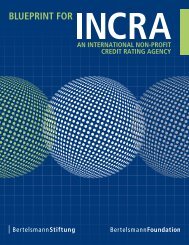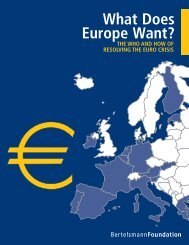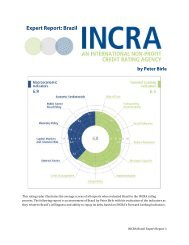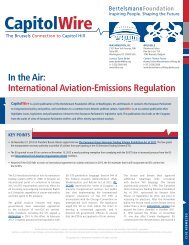home affairs (JHA), particularly in theEuropean Parliament and DG JUST, theDepartment of Justice’s counterpart inthe European Commission.Brussels has traditionally questionedthe blending of CIA (intelligence)and JSOC (military) activities in UScounterterrorism policy. The EUcounterterrorism coordinator, amongothers, believes the American methodcreates “de facto accountability gaps”over which congressional intelligenceand defense committees lack properoversight. For the EU, issues such asthe status of Guantanamo and increaseduse of drone strikes raise questionsabout US respect for constitutional andinternational law. Brussels wants tosee Guantanamo close, but Europeans’opinion is divided over unmanned droneattacks. In any case, neither issue willseriously affect the US-EU relationshipin the near future. The UK already hasarmed drones in Afghanistan, andItaly will have surveillance dronesthere beginning in 2013. France alsohas plans to use military drones forreconnaissance and attack missions.European political leaders, includingGerman Chancellor Angela Merkel,French President François Hollande,and EU foreign-policy chief CatherineAshton, have not publicly criticized thepractice of targeted killings.Positions on travel policies,including those concerningthe VWP and bodyscanners, remain patchyacross the EU. But Brussels’role in this area is growing.Extraordinary rendition and secretdetention of terrorist suspects areadditional areas in which significantEuropean opposition to UScounterterrorism practices has arisen.The EU outlined in February 2012how military detentions could havea negative impact on internationalcooperation. But US operational policyin this area is bilateral. Some memberstates, including Germany and the UK,have held parliamentary inquiries aboutUS government malfeasance but havefailed, from the EU’s perspective, to berigorous enough. 10 Other member stateshave not formally addressed renditionand detention. The European Parliamenthas passed a non-binding resolution toreopen member state investigations intosecret CIA renditions in several CentralEuropean countries. 11On intelligence sharing, bilateralrelationships remain critical andmember states want to maintain that.The UK is extremely comfortable with itsopen intelligence sharing relationshipwith the US. While the British have aspecial position with certain opt-outs onEU decisions in the realm of freedom,security and justice—a position thatcould be complicated by the block JHAopt-out announcement by the BritishHome Office 12 —they can opt intoagreements, as they did in March 2012with the US-EU PNR agreement. 13 In fact,the UK had its own PNR system in placeand shared information exclusively withthe US. London also led the effort tocreate the EU’s PNR directive. Germanintelligence also cooperates closely withthe CIA, the FBI, and the US military.But after an incident in which a Germanintelligence tip led to the killing ofGerman-citizen Islamists in US droneattacks in Waziristan, Pakistan has raisedthe issue domestically and compelledBerlin to establish limits on sharinginformation on German citizens.Positions on travel policies, includingthose concerning the VWP and bodyscanners, remain patchy across the EU.But Brussels’ role in this area is growing.The EU called for and approved a commonEuropean position on body scanners, 14but member states have been given theleeway to decide to use the technologyor not and some, including Spain, Italy,and France, have wavered or refrainedfrom doing so due to privacy concerns.Others, including the Netherlands andthe UK, have been among the first toimplement it: The Dutch were the first toembrace the technology since the 2009underwear bomber departed for the USfrom Amsterdam’s Schiphol airport.Finally, there is a deep sense in theEU that its privacy and data protectionsafeguards are superior to those in theUS. EU Justice Commissioner VivianeReding has stated that Washingtonshould catch up to the “gold standard”being set by Brussels. 15 The EU has itsown data-protection system, currentlyunder reform through proposals thatcame from the commission and areworking their way through parliament.Recommendations for 2013These heavy, sometimes frustratingnegotiations have placed cooperation ona sounder footing for 2013 and beyond;they have allowed the US to work withthe EU as a meaningful partner andcould serve as a model for US-Europeanrelations in other policy areas. Given thehigh stakes for the safety and rights ofcitizens on both sides of the Atlantic,the expression of trust between theUS and Europe in this area has beenimpressive. The primary responsibilityof the next administration will be toguarantee successful implementation ofrecent agreements while simultaneouslybuilding on broader initiatives like VWPreform and the comprehensive DataProtection and Privacy Agreement.1. Monitor implementationof new agreements:In its first term, the Obamaadministration initiated significantchanges in data sharing and screeningrelationship between the US andEurope. Implementation of theseagreements across member statesshould be monitored with the utmostcare. Hiccups in implementing theagreements will be followed closelyby local media, especially in areasinvolving US officials from agenciessuch as Customs and Border Protection(CBP) and TSA. These could lead tohigh-profile hearings and possiblebacklash in national parliaments and theEuropean Parliament in particular. PNRdata exchange and no-fly enforcementmust strictly adhere to the terms of theagreement for flights to and from the US.Incidents such as the recent case of aCuba-bound flight from Spain could put4 0Counterterrorism and Homeland Security
these delicately negotiated agreementsunder renewed scrutiny. 16 At the sametime, the US should also remaincognizant of patchwork implementationacross member states and be willing toraise these concerns both nationally andin Brussels.2. Understand institutionallimitations, particularly regardingindependent legislatures:Both sides need to recognize thatadministration negotiators are not theonly decision makers. Legislators havean important, often underappreciated,role. The EU has called for the US torepeal section 1021 of the NationalDefense Authorization Act (NDAA) andend indefinite detention of terroristsuspects. 17 It would also reopen thePrivacy Act to give European citizensjudicial redress regarding their personaldata. 18 But these efforts would requirecongressional revision, which isunlikely given their low priority forUS constituents and Washington’slegislative gridlock. Likewise, theEU’s institutional structure grants theEuropean Parliament an importantvoice in international agreements, andit is prepared to speak up. Concernsabout the US ignoring civil liberties orprivacy concerns, and its tendency todictate trans-Atlantic counterterrorismpolicy, resonate loudly in theEuropean Parliament.a) Pursue VWP reform early in 2013:The administration should seek areasin which progress with Congresscan be made. On VWP, the Obamaadministration should promote aretooling of the program so that it isat once more secure and practical. ThePolish remember the president’s pledgeto reform the VWP system to allow forPoland’s admission, made at his firstjoint press conference with PresidentBronisław Kamorowski in December2010 and renewed during Obama’svisit to Poland in 2011. A bipartisan,bicameral group of legislators introducedlegislation in 2011 that would facilitate apath to VWP for the remaining four EU“outs” (Poland, Bulgaria, Romania andCyprus) in the coming years. 19 Much ofthe most vociferous Senate oppositionto an expanded VWP dissolved in 2012.Implementing a more sound VWP regimefor Europe will have two constructiveconsequences: 1) it will fulfill theadministration’s commitment to Polandthat it would enter VWP during Obama’sterm in office and 2) it will hastenthe convergence of an EU-wide VWPregime that is consistent with the post-Lisbon mandate to introduce uniformvisa policies.3. Promote forward-lookingforums for discussion:Forums such as the High-LevelContact Group (HLCG) on privateand data protection are important forperpetuating talks on fundamentaldifferences between systems. Theseforums are the most effective vehicleto achieve agreement on methods thatsatisfy concerns on both sides of theocean. To strengthen US-EU ties, theDepartment of Homeland Security(DHS) and the Department of Justiceon the one hand and the JHA Council,DG HOME, and DG Just on the othercould aim for more exchanges betweenofficials. Greater interlocutor linksbetween the National CounterterrorismCenter (NCTC) and SitCen, the FBI andEuropol, the Department of Justice andEurojust, DG MOVE and the TSA are alsorecommended. 20 These working-levelrelationships help generate trust thatleads to cooperation. Mutual recognitionof certifications and standards in areassuch as cargo security, a most efficientpolicy tool for both sides, is a productof frequent operational meetings ofbilateral working-level forums. They canbe venues for talks on frontier topicssuch as civilian usage of repatriatedunmanned aerial vehicles (UAVs).Moreover, the EU is negotiating an intra-EU TFTP agreement, an intra-EU PNRagreement, Europol, and Eurojust in2013 and will reform its data-protectionregime in 2014. These could affect the USapproach to agreements with Europe.The forums would guarantee consistencyin rapidly evolving legal frameworks inthe US and the EU.4. Pursue the widest possibleagreement on data protectionand privacy with mutualrecognition at the core:The umbrella US-EU Data Protection andPrivacy Agreement under negotiationis an ambitious undertaking thatcould remove one of the most difficultbarriers to US-EU cooperation oncounterterrorism. The precedents set inthis agreement will have spillover effectson the commercial sector.Both sides should ensure that anagreement is as robust as possible. TheEU has the legal authority to negotiate[data protection and privacy] with thirdcountries, and the Commission and theEuropean Parliament have seized thismandate. European data transferredto a third country must be met by “anadequate level of protection” by thosecountries. This gives the Commissionauthority to decide whether the USappropriately handles EU citizens’personal data.The EU has the legalauthority to negotiate[data protection andprivacy] with thirdcountries, and theCommission and theEuropean Parliament haveseized this mandate.The HLCG has determined that majordifferences on redress principlesexist. 21 Some European leaders haveinsisted that all Europeans have theright to redress before an impartial andindependent tribunal regardless of theirnationality or place of residence, as theEU Data Protection Directive maintains.The US Privacy Act, however, limitsjudicial redress to US citizens and legalpermanent residents. 22 Even though theDHS privacy office offered administrativeredress to non-US persons in 2009, 23 keymembers of the European Parliamentprefer their citizens to have access tojudicial review. 24 The alternative toamending the Privacy Act is ensuringCounterterrorism and Homeland Security4 1
- Page 3: Field Manual to EuropeIntroduction
- Page 6: multilateral channels. Europeanshav
- Page 9 and 10: JuneBritish presidency of UNSCJune
- Page 12 and 13: US-EU Investment vs. Global Nationa
- Page 14 and 15: economic conditions in the eurozone
- Page 17 and 18: MEMO ONTHE EUROZONE CRISISThe State
- Page 19 and 20: attitude toward moral hazard. Withw
- Page 21 and 22: Greece: 2010 Bailout BreakdownGreec
- Page 23 and 24: the deficit from 4.5 percent to thr
- Page 27 and 28: NATO thus faces an uncertain future
- Page 29 and 30: 1. Consider NATO’s defensespendin
- Page 31 and 32: of-area operations and worldwidepar
- Page 33 and 34: concurrent terrorist attack in Beng
- Page 35: 2. Strengthen regionalpartnerships
- Page 38 and 39: MEMO ONCOUNTERTERRORISM ANDHOMELAND
- Page 43 and 44: Status of EU Countries in the US Vi
- Page 45 and 46: offensive capability centered at NA
- Page 47 and 48: socialized, i.e. there is a tacit e
- Page 49 and 50: such technology, such as deep packe
- Page 51 and 52: MEMO ONENERGY & CLIMATE CHANGEThe S
- Page 54 and 55: identifying the agents most qualifi
- Page 56 and 57: MEMO ONTURKEYThe State of PlayTurke
- Page 58 and 59: as a rising regional and internatio
- Page 60 and 61: CASE STUDY: TURKEY’S ENERGY ROLE:
- Page 62 and 63: 22%12%Turkey’s Main Trading Partn
- Page 64 and 65: MEMO ONRUSSIAThe State of PlayIn Pr
- Page 66 and 67: EU-Russia security apparatus. Themo
- Page 68 and 69: greater market access for US busine
- Page 70 and 71: MEMO ONCHINAThe State of PlayIn 201
- Page 72 and 73: But China’s competitive meridian
- Page 74 and 75: in millions of USDUS-China Bilatera
- Page 76 and 77: 7 6Acknowledgements
- Page 78 and 79: CITATIONSINTRODUCTION1See “Confid
- Page 80 and 81: 20Castle, S. (17 September, 2011).
- Page 82 and 83: ARAB UPRISING1Koch, C. (summer 2011
- Page 84 and 85: COUNTERTERRORISM & HOMELAND SECURIT
- Page 86 and 87: 21Healey, J. (January 2012). Beyond
- Page 88 and 89: 20Berlemont, I. (25 July, 2012). Fr
- Page 90 and 91:
24Putin, V. (6 September, 2012). An
- Page 92:
Bertelsmann Foundation1101 New York






